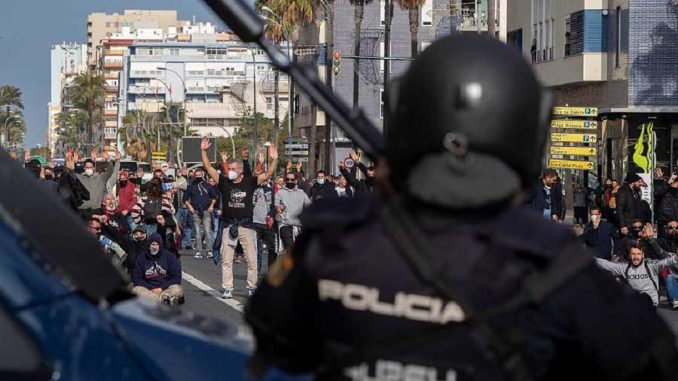
With more austerity, cuts in conquests and abuses, the bosses want the capitalist crisis to be paid for by the workers. We must stop them.
By Rubén Tzanoff
On Tuesday, November 16, workers began an indefinite strike as a result of the blockage in the negotiation of the collective agreement. The anti-worker positions of the Federation of Metal Companies of Cadiz (Femca) are responsible for the failure of the dialogue. The strike, which went ahead despite the maneuvers of the CC.OO. and UGT, confronts the employers’ attempts to cut down on wages, eliminate extra pay, extend the working schedule, cut incentives and refuse to pay for risky labor. And before this, a successful two-day strike had already taken place this month.
A strong will to fight
The government answered to the demands by deploying the National Police and the Civil Guard. Last Monday, during the Río San Pedro protests, the riot police went as far as to use a tank. The Junta of Andalusia, fearful of the extension of the conflict, intends to carry out a mediation to neutralize the protest.
In spite of this, they did not succeed in hindering the will of the workers’ struggle. During the eight days of the strike, there were pickets in the factories of San Fernando, Puerto Real, El Puerto de Santa Maria and Cadiz. Barricades were settled to confront the police formations. In addition, mobilizations were carried out with the support of different social sectors, such as the Students Union.
More demands in the face of the crisis
The crisis of the capitalist economy was installed with layoffs, restructuring and austerity throughout the Spanish state, with which deindustrialization, poverty and social inequality spread. The Bay of Cadiz is one of the most affected areas. Before the metal workers, it was the Airbus and Navantia shipyard workers who mobilized against factory closures and precarious work. In Catalonia, the Nissan workers did the same, and in Amariña, Lugo, the anger against industrial dismantling was also expressed.
Employers and government, a dangerous partnership
In the Spanish labor sphere, the arbitrariness imposed by the labor reforms of Mariano Rajoy (PP), which were not annulled by the “progressive coalition” government of the PSOE-Unidas Podemos, dominates. Promises of cancellation were transformed into negotiations for partial changes. The bosses’ profits are not guaranteed on their own, they are nourished by the support of successive governments to the scaffolding of capitalist exploitation.
No confidence in union bureaucracy
The leaders of the main trade union centers are responsible for the loss of historical conquests of the working class. Their main sphere of action is not in the streets but in the ministerial offices and business offices. It is there where they seal agreements behind the backs of the workers.
The CC.OO. and UGT union bureaucrats are not to be trusted, it is impossible to ignore their actions in the NISSAN conflict. They always apply the same pattern of behavior: try to prevent the claim from exploding, isolate it and/or hand it over. They do not want tough measures, they do not want the rank and file to decide everything, to build coordination bodies and, much less, to take the management of the conflict into their hands.
No confidence in the union bureaucracy
The leaders of the main trade union centers are responsible for the loss of historical conquests of the working class. Their main sphere of action is not in the streets but in ministerial and business offices. That is where they seal agreements behind the backs of the workers.
The CC.OO. and UGT union bureaucrats are not to be trusted, it is impossible to ignore their actions in the NISSAN conflict. They always apply the same pattern of behavior: they try to prevent the grievance from breaking out, isolate it and/or hand it over. They want to avoid deep measures, they do not want the rank and file to decide anything, to build coordination bodies and, even less, to take the management of the conflict into their hands.
Partial measures are not enough
The strike is having such an impact that it is forcing the positioning of different sectors. In Congress, the former leader of Podemos, currently spokesman of Más País-Equo, Íñigo Errejón, asked the Minister of Internal Affairs, Fernando Grande Marlaska, for explanations. The parliamentary group of Unidas Podemos presented a statement rejecting “any type of criminalization” of the protest. And the mayor of Cadiz, Jose Maria “Kichi” Gonzalez Santos, came out in support of the workers. These are positive gestures in the face of the reactionary positions of PSOE, PP, Cs and Vox, but very limited. In an indefinite strike, partial measures are not enough: it is necessary to promote mobilization and put all available resources at the service of the workers’ triumph.
With the workers in struggle
The struggle of Cadiz should not be confined to the Andalusian workers, it should be a cause of the entire working class. The broadest unity of action in defense of the workers and their rights is necessary to spread the struggle in the workplaces and to overflow social media with statements using the hashtags #HuelgaDelMetal #MetalCadiz #CadizEnLucha. Union leaders have to make themselves available for the struggle, and call for a big national march and for a general strike. Along with a program to meet immediate needs, such as the annulment of the labor reform and transitional measures as the nationalization under workers control of any company that closes, among others. Solidarity must come from every corner of the world. If the metal workers of Cadiz win, we all win. We would be stronger to face the coming austerity measures and to make the capitalists pay for the crisis.








